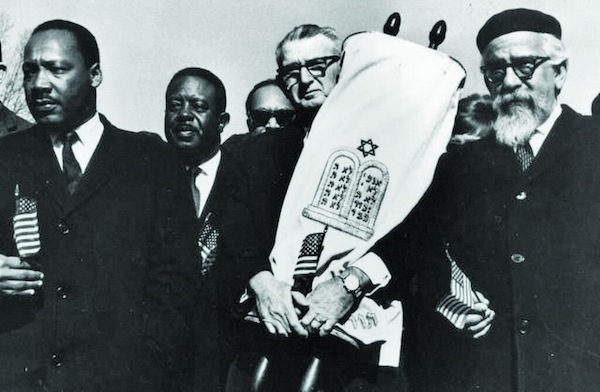A still from the documentary Shared Legacies: From the left are Martin Luther King Jr., Ralph Abernathy, Maurice Eisendrath and Abraham Joshua Heschel during the march from Selma to Montgomery, 1965.
The Victoria Shoah Project held a panel discussion on Oct. 20, following an online showing of the documentary Shared Legacies: The African American-Jewish Civil Rights Alliance.
The 2020 film, part of the sixth annual Victoria International Jewish Film Festival, chronicles the common history of prejudice and hardships each group has faced, and features footage of the relationships of such luminaries as Dr. Martin Luther King and Rabbi Abraham Joshua Heschel. Included are interviews with many prominent civil rights leaders of the time, such as Andrew Young, John Lewis, Rabbi Alvin Sugarman and Rabbi Peter S. Berg.
After the screening, there was a Vancouver Island-based panel discussion with Adrienne and Barrie Carter, Paul Winn and the Victoria Shoah Project’s Robert Oppenheimer. From their own experiences, they each spoke about African-Canadian and Jewish-Canadian relations. They also talked about the film, and the events from 1960s America that it depicts, from personal, historical, present-day and Canadian perspectives. Rick Kool, also of the Shoah Project, served as moderator.
Adrienne Carter was born in Hungary in 1944, as the Nazis marched into the country and were increasing their campaign to exterminate the Jews. Many in her extended family died in Auschwitz. She and her family moved to Canada in 1956, following the Hungarian Revolution. “The whole stateless experience is very well known to me,” she recalled. “I married Barrie in 1965, at a time when Blacks and whites rarely ever connected, let alone married, and at a time when many Southern states had laws against interracial marriages.”
A co-founder and the director of services at the Vancouver Island Counseling Centre for Immigrants and Refugees, she has spent much of her working life helping immigrants by providing therapy to those who have experienced trauma, including intergenerational trauma.
Barrie Carter, who was a special needs education assistant until his retirement, told the audience of his early years. Born in Jacksonville, Fla., he moved to the northeastern part of the country where, in his teens, he volunteered with the NAACP in Bridgeport, Conn., and in New York and picketed Walgreens to challenge their segregationist luncheonette policies in the South. He immigrated to Canada on a bicycle in 1963. “While I was riding north, people were taking the bus south to the March on Washington. But I just had to get away,” he said.
Both Barrie and Adrienne Carter have traveled around the world, providing services to victims of torture and genocide.
Winn, whose work experience includes having been the executive director of the Canadian Race Relations Foundation, followed by recounting his experiences growing up in Toronto’s diverse Kensington Market neighbourhood.
“When I was 10 or 11, I was a Shabbos goy. I would do some things for the neighbours on Saturdays because they were unable to perform those tasks for religious reasons,” Winn recalled. “I got invited to bar and bat mitzvahs.”
He said, “It was natural for the Black and Jewish communities to support each other when there were struggles with such things as immigration. When I watched the film, I remembered how the connection between the religious Black and Jewish communities helped bring about a lot of activities in Canada, as well.”
Oppenheimer, a clinical psychologist with a focus on traumatized children and youth, a human rights activist and a staunch promoter of Holocaust education, also shared some information about his career. Reflecting on the 28 years he spent working in Detroit, he said, “It was an interesting experience for me. I was the only non-African-American on the staff and I was impressed with how welcoming the community was to me.
He added, “One of the things that impressed me about the movie was when Heschel said ‘not to be a bystander to history.’ I think that is central to my idea of human rights, that we cannot just stand by.”
“One of the things that really hit me in the film,” said Kool, “was a pastor standing in a church with a rabbi who said, ‘Reverend King isn’t here anymore, Rabbi Heschel isn’t here anymore, but are their children here now?’”
Barrie Carter observed that the youth in activist groups today “have the same dynamism as we did. They have an energy and a knowledge of concepts. It isn’t just a blind following. It is a positive morality.”
“They seem to believe it is part of their responsibility to make things better,” added Winn about today’s activists. “They want to make things better.”
Sam Margolis has written for the Globe and Mail, the National Post, UPI and MSNBC.
***
Note: This article has been amended to reflect the correct name of the film festival. It is the Victoria International Jewish Film Festival.

